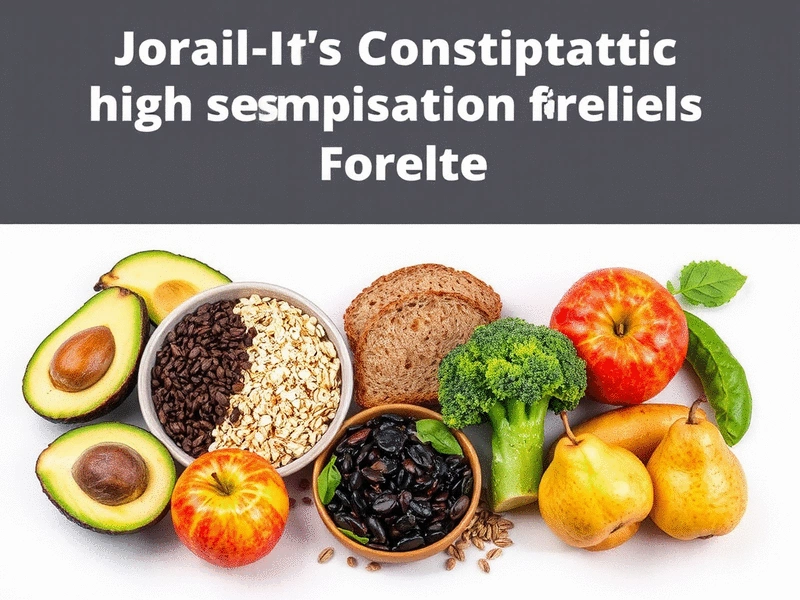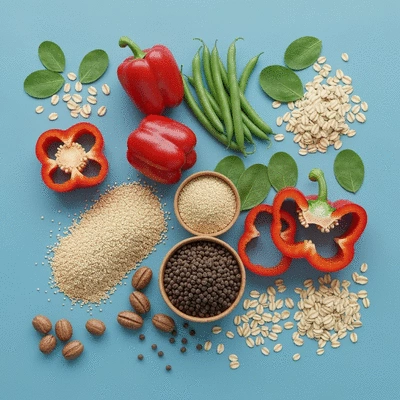Common Causes of Constipation
- • Low fiber diet
- • Insufficient hydration
- • Lack of physical activity
- • Certain medications
- • Stress and anxiety
What if a simple tweak in your diet could transform your digestive health? Understanding the role of fiber can be a game-changer in managing constipation and improving overall well-being. Let’s explore how you can make informed dietary choices that empower your gut health!
Delve into the core reasons behind constipation and discover how dietary fiber can be your ally in achieving digestive comfort. Below, we break down the causes and highlight the crucial role of fiber in promoting regular bowel movements.
Both are essential for optimal digestive health and regularity.
Constipation can feel like a heavy weight, but understanding what it is and why it happens is the first step towards relief. Essentially, constipation is defined as infrequent or difficult bowel movements, often accompanied by discomfort. You might wonder, what causes this uncomfortable situation? A variety of factors contribute, including diet, hydration, stress, and even certain medications. Recognizing these causes can help you take control of your digestive health!
At Constipation Solutions Co., we've seen that many individuals experience constipation due to a lack of fiber in their diet. Fiber plays a crucial role in maintaining regular bowel movements by adding bulk to the stool and helping it move through the intestines. If you’re one of the many looking for answers, you've come to the right place! Let's dive deeper into the significance of fiber and how it can transform your digestive well-being.
Constipation is more than just a minor inconvenience; it can impact your overall health and quality of life. When you’re experiencing difficulty in having regular bowel movements, you might feel bloated, uncomfortable, or even moody. Common causes of constipation include:
Understanding these factors is vital. For instance, if your diet is low in fiber, your body lacks the necessary components to facilitate smooth digestion. This is why I often emphasize the importance of fiber in my consultations with patients, as it can make a significant difference in everyday comfort. For a comprehensive overview of constipation and its management, you can refer to resources like the National Library of Medicine's detailed information on constipation.
So, how does fiber actually help alleviate constipation? There are two main types of fiber: soluble and insoluble. Soluble fiber dissolves in water and can help regulate blood sugar and cholesterol levels, while insoluble fiber adds bulk to the stool and promotes its passage through the digestive tract. Both types are essential for optimal digestive health!
When you incorporate high-fiber foods into your meals, you effectively encourage regular bowel movements. Some excellent sources of fiber include:
By focusing on these foods, not only will you enhance your fiber intake, but you'll also support your overall digestive health. It's all about making choices that empower you to feel great each day! For more insights on the effectiveness of dietary fiber in managing constipation, you can explore studies such as this research on functional constipation and dietary fiber intervention.
I couldn't find a specific YouTube video titled "10 High-Fiber Foods to Relieve Constipation Naturally" that meets the criteria. However, here is an embed code for a video that discusses foods that help with constipation:
Have you recently incorporated high-fiber foods into your diet? We want to know how it has impacted your digestive health! Share your experience or any tips you have for managing constipation in the comments below:
As we’ve explored, incorporating high-fiber foods into your diet is crucial for managing constipation and promoting overall digestive health. These foods work by adding bulk to your stool, making it easier to pass, and they help keep your digestive system running smoothly. By focusing on a variety of fiber sources—like fruits, vegetables, grains, legumes, nuts, and seeds—you can effectively combat digestive discomfort and enhance your well-being!
Let’s recap the key points regarding high-fiber foods for constipation relief. A diet rich in fiber not only helps you feel better but also supports lasting health benefits. Here are some key takeaways for constipation relief:
These simple strategies empower you to take control of your digestive health. By making informed choices about your diet, you're setting yourself up for long-term success!
At Constipation Solutions Co., we believe that healthy dietary choices lay the foundation for ongoing digestive comfort. With every meal, you have the opportunity to nourish your body with wholesome foods. This is where you should consider your relationship with food and how it impacts your digestive system. Remember, it’s not just about adding fiber; it’s about creating a balanced approach that works for you!
Here are some tips to encourage healthy dietary choices:
By embracing a variety of fiber-rich foods and keeping these tips in mind, you’re not only addressing constipation but also investing in your long-term health. Remember, your journey to optimal digestive wellness is within reach!
As you continue your journey toward digestive health, take a moment to reflect on how you can make informed choices about your fiber intake. Every small change you make can add up to significant improvements in your overall wellness. Start by reviewing your current diet and identifying areas where you can incorporate more fiber-rich foods.
Here are some practical steps to help you in this process:
These actionable steps will help you become more mindful about your food choices, setting you up for success in managing your constipation!
While it’s great to take charge of your dietary choices, there are times when consulting a professional is essential. If you find that increasing your fiber intake leads to discomfort, or if constipation persists despite dietary changes, it may be time to seek expert advice. Speaking with a healthcare provider can help you navigate potential underlying issues or tailor a plan specifically to your needs. It's important to note that for some, increasing fiber might not be the complete answer, and other factors may need to be considered. For more information on when fiber might not be the sole solution, you can read insights from UH Hospitals on why more fiber might not always be the answer.
Here’s when you should consider reaching out for help:
Your health is important! Seeking guidance ensures that you have the best support on your journey to improved digestive health, and it can help you feel more confident in managing your gut health effectively.
Here is a quick recap of the important points discussed in the article:



 Did you know that incorporating daily exercise can dramatically improve your digestive health? Regul
Did you know that incorporating daily exercise can dramatically improve your digestive health? Regul
 Did you know that staying hydrated can significantly improve your digestive health? Understanding th
Did you know that staying hydrated can significantly improve your digestive health? Understanding th
 Understanding your financial options when it comes to constipation treatments can empower you to mak
Understanding your financial options when it comes to constipation treatments can empower you to mak
 Struggling with constipation can be frustrating, but you don’t have to face it alone. Pelvic floor
Struggling with constipation can be frustrating, but you don’t have to face it alone. Pelvic floor